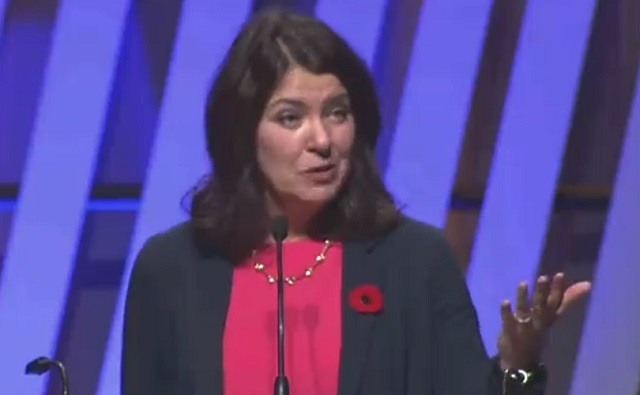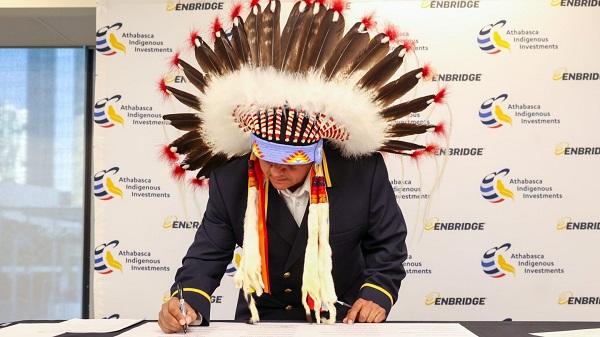Alberta
Danielle Smith slams Trudeau’s carbon tax exemption for Atlantic Canada and not rest of country

From LifeSiteNews
‘As a Canadian, do you feel it is fair to continue paying the carbon tax on home heating when some places are now exempt?’ the Alberta premier asked.
Alberta Premier Danielle Smith chided Prime Minister Justin Trudeau as being unfair in not applying “tax fairness” for Albertans and all Canadians after Trudeau announced a pause on the carbon tax for home heating oil but only for Atlantic Canada.
“If you’re going to have a federal government asserting that they have to have this power so that everybody is treated equally, then they don’t treat everyone equally. It seems to me that that’s something that should go back to the court and ask them whether or not they want to reconsider whether this is an appropriate use of the federal powers,” Smith said recently at a press conference.
“I would rather the federal government accept that if this is a painful tax coming into winter for Atlantic Canadians, it’s a painful tax going into the winter for everyone and just make sure that he does the right thing and takes the tax off for all types of home heating and every province,” Smith said.
As a Canadian, do you feel it is fair to continue paying the carbon tax on home heating when some places are now exempt?
Comment below 👇 pic.twitter.com/9jHEp9cFpK
— Danielle Smith (@ABDanielleSmith) November 2, 2023
Smith has been fighting a prolonged battle with the Liberal federal government of Trudeau, who has gone on the attack against Alberta’s oil and gas industry through the implementation of ideologically charged laws, including the punitive carbon tax.
Trudeau, however, has given breaks to some parts of the country on the carbon tax for home heating fuels but not others.
He recently announced that he was pausing the collection of the carbon tax on home heating oil in for three years, but only for Atlantic Canadian provinces. The current cost of the carbon tax on home heating fuel is 17 cents per litre. Most Canadians, however, heat their homes with clean-burning natural gas, a fuel that will not be exempted from the carbon tax.
Trudeau’s announcement came amid dismal polling numbers showing his government will be defeated in a landslide by the Conservative Party come the next election.
This resulted in federal Conservative Party (CPC) leader Pierre Poilievre daring Trudeau to call a “carbon tax” election so Canadians can decide for themselves if they want a government for or against a tax that has caused home heating bills to double in some provinces.
Recent political challenges against the carbon tax have failed. Recently, a CPC motion calling for the carbon tax to be paused for all Canadians failed to pass after the Liberal and Bloc Quebecois MPs voted against it. This motion interestingly had support from the New Democratic Party (NDP) but that was not enough to get it passed.
Canadian premiers come together to demand carbon tax pause for all provinces
Trudeau’s latest offering of a three-year pause on the carbon tax in Atlantic Canada has caused a major rift with oil and gas-rich western provinces, notably Alberta and Saskatchewan, and even Manitoba, which has a new NDP government.
This prompted all premiers of Canada to come together to call on the Trudeau government to extend the carbon tax fuel pause to all Canadians.
“All this is doing is causing unfairness, making life less affordable, and really harming the most vulnerable as we get into the winter season,” Smith said today about most provinces being left out of the carbon tax pause.
Going one step further, on November 10, Five Canadian premiers from coast to coast banded together to demand Trudeau drop the carbon tax for home heating for all Canadian provinces, saying his policy of giving one region a tax break over another have caused “divisions” in Canada.
After Trudeau announced a special tax break for Atlantic Canada, Saskatchewan Premier Scott Moe said his province will stop collecting a federal carbon tax on natural gas used to heat homes on January 1, 2024, unless it gets a similar tax break as the Atlantic Canadian provinces.
Alberta has repeatedly promised to place the interests of their people above the Trudeau government’s “unconstitutional” demands while consistently reminding the federal government that their infrastructures and economies depend upon oil, gas, and coal.
As for Smith has fought back, and recently tore a page off a heckler’s fantasy suggestion of a solar and wind battery-powered future after she stepped into the lion’s den to advocate for oil and gas at a conference hosted by a pro-climate change think tank.
Smith has said she will be looking into whether a Supreme Court challenge on the carbon tax is in order. She noted, however, that as Alberta has a deregulated energy industry, unlike Saskatchewan, she is not able to stop collecting the federal carbon tax.
The Trudeau government’s current environmental goals – in lockstep with the United Nations’ “2030 Agenda for Sustainable Development” – include phasing out coal-fired power plants, reducing fertilizer usage, and curbing natural gas use over the coming decades.
The reduction and eventual elimination of the use of so-called “fossil fuels” and a transition to unreliable “green” energy has also been pushed by the World Economic Forum (WEF) – the globalist group behind the socialist “Great Reset” agenda – an organization in which Trudeau and some of his cabinet are involved.
The Trudeau government has also defied a recent Supreme Court ruling and will push ahead with its net-zero emission regulations.
Canada’s Supreme Court recently ruled that the federal government’s “no more pipelines” legislation is mostly unconstitutional after a long legal battle with the province of Alberta, where the Conservative government opposes the radical climate change agenda.
Alberta
Made in Alberta! Province makes it easier to support local products with Buy Local program

Show your Alberta side. Buy Local. |
When the going gets tough, Albertans stick together. That’s why Alberta’s government is launching a new campaign to benefit hard-working Albertans.
Global uncertainty is threatening the livelihoods of hard-working Alberta farmers, ranchers, processors and their families. The ‘Buy Local’ campaign, recently launched by Alberta’s government, encourages consumers to eat, drink and buy local to show our unified support for the province’s agriculture and food industry.
The government’s ‘Buy Local’ campaign encourages consumers to buy products from Alberta’s hard-working farmers, ranchers and food processors that produce safe, nutritious food for Albertans, Canadians and the world.
“It’s time to let these hard-working Albertans know we have their back. Now, more than ever, we need to shop local and buy made-in-Alberta products. The next time you are grocery shopping or go out for dinner or a drink with your friends or family, support local to demonstrate your Alberta pride. We are pleased tariffs don’t impact the ag industry right now and will keep advocating for our ag industry.”
Alberta’s government supports consumer choice. We are providing tools to help folks easily identify Alberta- and Canadian-made foods and products. Choosing local products keeps Albertans’ hard-earned dollars in our province. Whether it is farm-fresh vegetables, potatoes, honey, craft beer, frozen food or our world-renowned beef, Alberta has an abundance of fresh foods produced right on our doorstep.
Quick facts
- This summer, Albertans can support local at more than 150 farmers’ markets across the province and meet the folks who make, bake and grow our food.
- In March 2023, the Alberta government launched the ‘Made in Alberta’ voluntary food and beverage labelling program to support local agriculture and food sectors.
- Through direct connections with processors, the program has created the momentum to continue expanding consumer awareness about the ‘Made in Alberta’ label to help shoppers quickly identify foods and beverages produced in our province.
- Made in Alberta product catalogue website
Related information
Alberta
Province to expand services provided by Alberta Sheriffs: New policing option for municipalities

Expanding municipal police service options |
Proposed amendments would help ensure Alberta’s evolving public safety needs are met while also giving municipalities more options for local policing.
As first announced with the introduction of the Public Safety Statutes Amendment Act, 2024, Alberta’s government is considering creating a new independent agency police service to assume the police-like duties currently performed by Alberta Sheriffs. If passed, Bill 49 would lay additional groundwork for the new police service.
Proposed amendments to the Police Act recognize the unique challenges faced by different communities and seek to empower local governments to adopt strategies that effectively respond to their specific safety concerns, enhancing overall public safety across the province.
If passed, Bill 49 would specify that the new agency would be a Crown corporation with an independent board of directors to oversee its day-to-day operations. The new agency would be operationally independent from the government, consistent with all police services in Alberta. Unlike the Alberta Sheriffs, officers in the new police service would be directly employed by the police service rather than by the government.
“With this bill, we are taking the necessary steps to address the unique public safety concerns in communities across Alberta. As we work towards creating an independent agency police service, we are providing an essential component of Alberta’s police framework for years to come. Our aim is for the new agency is to ensure that Albertans are safe in their communities and receive the best possible service when they need it most.”
Additional amendments would allow municipalities to select the new agency as their local police service once it becomes fully operational and the necessary standards, capacity and frameworks are in place. Alberta’s government is committed to ensuring the new agency works collaboratively with all police services to meet the province’s evolving public safety needs and improve law enforcement response times, particularly in rural communities. While the RCMP would remain the official provincial police service, municipalities would have a new option for their local policing needs.
Once established, the agency would strengthen Alberta’s existing policing model and complement the province’s current police services, which include the RCMP, Indigenous police services and municipal police. It would help fill gaps and ensure law enforcement resources are deployed efficiently across the province.
Related information
-

 espionage1 day ago
espionage1 day agoEx-NYPD Cop Jailed in Beijing’s Transnational Repatriation Plot, Canada Remains Soft Target
-

 Business2 days ago
Business2 days agoDOGE Is Ending The ‘Eternal Life’ Of Government
-

 2025 Federal Election2 days ago
2025 Federal Election2 days agoCanada drops retaliatory tariffs on automakers, pauses other tariffs
-

 2025 Federal Election2 days ago
2025 Federal Election2 days agoTucker Carlson Interviews Maxime Bernier: Trump’s Tariffs, Mass Immigration, and the Oncoming Canadian Revolution
-

 2025 Federal Election1 day ago
2025 Federal Election1 day agoBREAKING from THE BUREAU: Pro-Beijing Group That Pushed Erin O’Toole’s Exit Warns Chinese Canadians to “Vote Carefully”
-

 Daily Caller1 day ago
Daily Caller1 day agoTrump Executive Orders ensure ‘Beautiful Clean’ Affordable Coal will continue to bolster US energy grid
-

 Daily Caller1 day ago
Daily Caller1 day agoDOJ Releases Dossier Of Deported Maryland Man’s Alleged MS-13 Gang Ties
-

 2025 Federal Election1 day ago
2025 Federal Election1 day agoAllegations of ethical misconduct by the Prime Minister and Government of Canada during the current federal election campaign








